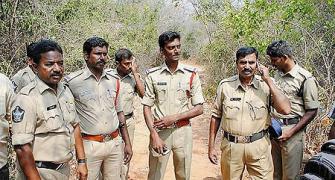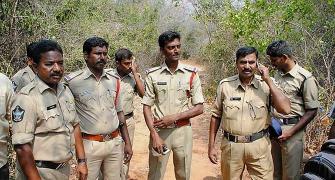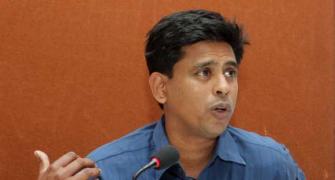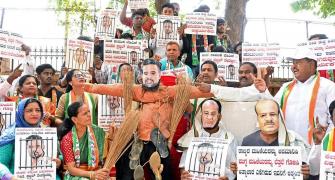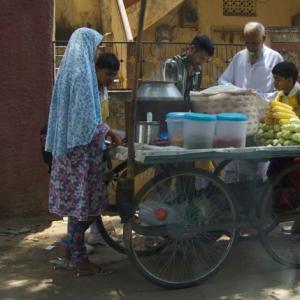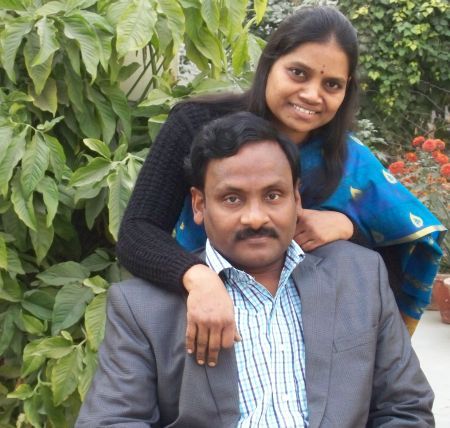 'If a Delhi University professor's rights can be violated so easily, then think about what the rest of the population, with even lesser means, has to suffer under the State.'
'If a Delhi University professor's rights can be violated so easily, then think about what the rest of the population, with even lesser means, has to suffer under the State.'
Professor G N Saibaba, who teaches English at Delhi University's Ram Lal Anand College, was arrested by the Maharashtra police on May 9, 2014 and charged with being a member of a banned terrorist organisation (the Communist Party of India-Maoist), providing logistics and helping in recruitment for the group.
Professor Saibaba, who is 90 per cent disabled, was imprisoned for 14 months at Nagpur Central Jail and mistreated and denied life-saving medicines despite repeated court orders.
He is currently out on bail for three months for medical treatment. His wife Vasantha Kumari A S spoke to Jyoti Punwani for Rediff.com about her husband's tribulations in jail.
Did you ever expect that Professor G N Saibaba would be arrested, given the police raids in 2013 and 2014?
No. Never. Sai was really cooperative during both the police raid and the interrogation. I never expected such injustice.
How did you cope financially with the half-salary after his suspension?
It was very difficult for me to manage the household. I had no source of income at all. The half-salary from the college had to be used to clear the monthly bank loan instalments.
Actually, according to central government service rules, after three months of suspension, we were supposed to receive 75 per cent of the salary, but this was not implemented by the college even after repeated pleas and applications till date.
I needed to go to Nagpur every month after Sai's arrest to meet him in prison. Sometimes I had to go more than once as his health started deteriorating. The travel costs alone were impossible. Putting this and the household expenses aside, my daughter's education was also a factor to consider.
We only survived because of the financial support we received from Sai's colleagues, friends and co-activists. I am really grateful for their help. Not only did the teachers of Delhi University take up a campaign for his release, but they also took up the responsibility of looking after every aspect of our family. Teachers from other universities in Delhi and outside also joined these efforts.
Sai's colleagues helped not just financially, but also emotionally. It was due to their constant support that I could go ahead in life. I could rely on them whenever I wanted. I would like to thank them all.
In times like this, everyone's support matters a lot. They encouraged me and my family to face the situation.
A collective called Committee for the Defence and Release of Dr G N Saibaba consisting of teachers and intellectuals across the country was formed. They relentlessly pursued their task and without their effort -- protests, demonstrations, signature campaigns -- my husband wouldn't be sitting next to me right now.
How was the media's role?
The media gave a mixed response. Some openly accused my husband of being a Naxalite with an intention to create an image of a dreaded criminal. Such callousness and blatant accusations without any proof shocked me.
The Maharashtra press mostly gave a negative coverage based on police stories without taking any other view. But in places like Delhi, Telangana and Andhra Pradesh, the response was positive and factual.
I feel like the press in Maharashtra is controlled by the police. They only wrote what the police dictated, presenting the story under a false light that misled many. They reported that a 'very serious criminal and Maoist has been apprehended' by the 'great Maharashtrian police force.'
When I read the newspapers in Nagpur, I felt like the press was just a puppet dancing to the tunes of the powers-that-be.
This is not to say that I didn't receive support from any journalist. My husband's true story was covered well in other places. The media is the means through which we can have the truth come out in the fastest way. You know, as activists, I and my husband rely on the media extensively.
The National Human Rights Commission, the People's Union of Civil Liberties, Delhi University Teachers Association -- all protested and intervened. Did any of this help him?
Well, yes. The NHRC directed the Nagpur Central Jail authorities to provide Sai with medical treatment and facilities immediately. But the jail authorities never followed that order. No medicine was given to him.
Even the medicines that I used to take to the prison or the ones my brother-in-law used to carry with him every month we visited Sai, never used to reach him. It's no wonder his health deteriorated as fast as it did.
Both PUCL and DUTA have cooperated a lot and have played an essential role in this struggle. In Delhi, DUTA was especially helpful and aided me with the accommodation issue our family was facing for quite a while.
Any message to the teaching community at the Delhi University or other universities could be easily sent with DUTA's helping hand, particularly through its president, Dr Nandita Narain.
What was the effect on your daughter and his mother?
I cannot actually describe what my daughter and my mother-in-law went through, but I can only say that it was a heart-wrenching experience. My daughter is an adolescent and at such a crucial shifting point of her life something like this had to happen. That surely had some impact on her.
The one whose suffering I could most visually and physically notice was Sai's mother. With Sai's polio and physical handicap, she was a very overprotective mother who had raised her son under her protective arms ever since he was affected by polio at the age of 4 or 5.
For her to know that her beloved son has been thrown in the anda cell was shocking to say the least. I could see her physically fading away in these last 14 months.
Did you want him to agree to the charges so that he was put out of his suffering?
I never wished for anything like that and nor will Sai ever do that.
How can we wish to agree with such horrible false accusations the police have blatantly thrown on his head?
Situations were bleak and we were miserable, but I and my husband did stand up against Operation Green Hunt. We cannot make any such compromises to satisfy any political forces.
If Sai was the sort to make such a compromise, he would have never been arrested in the first place. The police officials have put pressure on him and harassed him many times, but he never gave up his activism. That's why his bail was rejected four times.
To tell you the truth, there is nothing we can agree with on their accusations. There is no question. They are completely fabricated. Why should one agree with lies?
How did the jailors behave with you?
The way they behaved was completely insulting and humiliating. They quickly labelled me as the wife of a Naxal prisoner and there was so much prejudice directed towards me outside the jail at the gate where I waited whole day from morning 8 to evening 6, that I cannot even imagine what Sai must have been going through inside.
If we went in the morning at 8 or 9 for the mulakat (meeting) and filled in the application, we would only be given an opportunity to meet him in the evening at 5. My brother-in-law and his family went through similar experiences.
They would keep us standing in the sun. They would give the excuse that it takes time to get a prisoner out of the high security anda cell.
We would send daily necessities like shirts, medicines, etc but only half of what we sent would be given to Sai, sometimes nothing.
The Nagpur Central Jail is really archaic and the jailors and cops aren't much better. It's not only us. A lot of the people who wanted to seek a mulakat with their loved ones came from faraway parts of the state and were mostly illiterate. They had no idea how the proceedings worked and the jailors kept them running from one place to another.
To get anything done, one has to bribe the officers through the guards at the gate. Otherwise, it's waiting time till the evening.
Should he continue with his activism?
Yes. I feel that he should continue with his activism even more rigorously. These events exposed us to another marginalised segment of society.
The people in the jail are mostly framed, or have committed petty crimes. Since they have no proper legal aid, they end up serving more time than what they would have got as maximum punishment.
When Sai described the situation to me, I was beyond shock. The cruelty and sub-human treatment imposed upon those poor prisoners is all the more reason to continue with activism. They cannot speak for themselves given their vulnerable situation, but Sai, who is exposed to the educated world of media and intellectuals, should work as an activist.
What have you learnt from this experience?
If one member of a family stands for democratic rights, all members of the family have to face the wrath of the Indian State. This has come to be the hallmark of Indian democracy.
If a Delhi University professor's rights can be violated so easily, then think about what the rest of the population, with even lesser means, has to suffer under the State.
Image: Vasantha Kumari with her husband Professor G N Saibaba.

